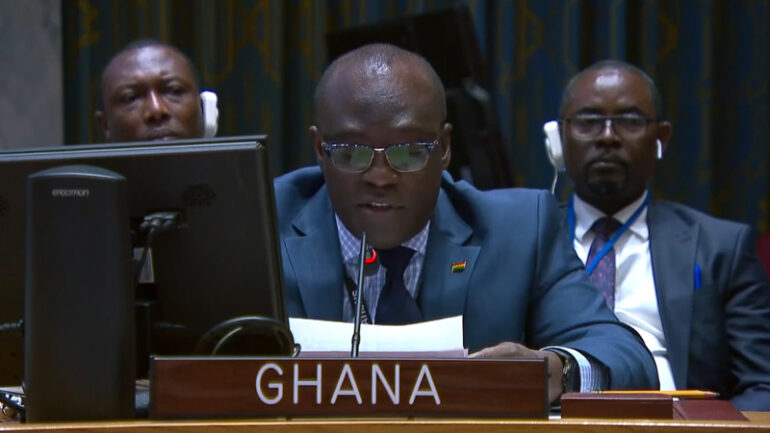UN Security Council briefing on the situation in Afghanistan (UNAMA)

Madam President
Let me begin by thanking UNAMA Deputy Special Representative General Markus Potzel, the Executive Director of the UNODC Ghada Fathi Waly, and Civil society briefer, Mrs. Fawzia Koofi, for their briefings to the Council.
We take note of the Secretary-General’s report and commend UNAMA for its untiring efforts in assisting the people of Afghanistan to lay new foundations for sustainable peace and development. We note, however, the worrisome trend of human rights abuses, deteriorating security situation, and a worsening humanitarian context, one year after Taliban took over as the de facto authority. We continue to be concerned by the reversal of the rights of women and girls, restrictions in the freedom of assembly and of expression, as well as by the indiscriminate and targeted killings which have reached record levels.We therefore wish to emphasise the following points:
(a) First, we hold the view that the right to education is a fundamental right that also serves as a foundation for sustainable development in thriving societies. We therefore join the call of the Organization of Islamic Conference, that of several councils of Islamic religious scholars and the many Islamic countries that have done so, in requesting an end to the restrictions imposed by the Taliban on the fundamental rights and freedoms of Afghan women and girls, including the ban on the secondary education of girls. A modern, progressive and prosperous Afghanistan is in the interest of all parties and we encourage the Taliban to see the role of women in such a context.
(b) Secondly, the grave violations against children and incidents of attacks against schools, hospitals and key infrastructure must stop. The recruitment of children as combatants and using them for supporting roles are clear infringement on their fundamental rights. We remind the de facto authorities, as those in present charge of the State, of their obligation to the international community and caution them to refrain from inhumane acts which jeopardize the well-being and safety of the Afghan children.
(c) Thirdly, we are appalled, but not surprised, by the continuous harbouring of terrorists groups such as ISIL/Daesh, ISIL-K and Al Qaeda by the Taliban authorities. This situation runs counter to the Taliban’s counter-terrorism commitment and further jeopardises the fragile security of the country and the region. We remind the de facto authorities of their State responsibilities and the consequences that entail from such actions under international law.
(d) Fourthly, we condemn the continuing incidents of the extrajudicial and high-profile killings, arrest, torture, ill-treatment and other violations targeting former government officials and Afghan National Defense and Security Forces. The Taliban should make a genuine effort at reconciliation in furtherance of the general amnesty it
announced in August 2021. It should undergird such efforts by releasing all civilians who have been arbitrarily detained by various Taliban members and groups over accusations of moral or religious infractions.
Mr. President,
In spite of the four concerns we have spoken about, we are hesitantly encouraged by the decision of the de facto authorities to facilitate the return of Afghans, including former government officials, and political figures from abroad and the desire to provide them with safety guarantees and limited employment opportunities. We also note the recent diplomatic engagement between the de facto authorities and countries in the region focusing on regional and border security, counterterrorism, drug trafficking, women rights, girls’ education, and inclusive governance. We particularly welcome the meeting of national security advisers of regional countries, where the de facto authorities were encouraged to create inclusive political structures, pursue a sustainable domestic and foreign policy, ensure compliance with the norms of international law, promote inclusive governance and respect for human rights, especially the rights of women including girls’ education, and address a potential security vacuum in Afghanistan.
Before concluding we encourage further support by donors in addressing the shortfall in meeting Afghanistan’s humanitarian needs which have been compounded by the sharp economic decline, and the devastating combination of decades of conflict, recurring natural hazards, and protracted vulnerability and the recent earthquakes.
Finally, we urge the de facto authority to, as a matter of priority, focus its attention on issues such as girls’ education, poverty alleviation and improved trade and economic conditions which are the legitimate expectation of the governed from those who govern.
I thank you.
